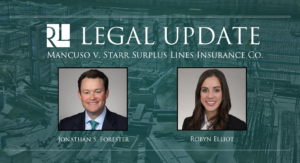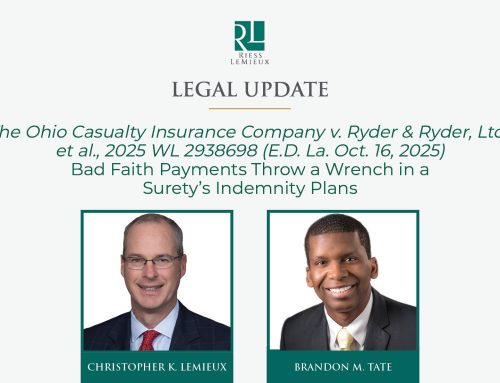 Mancuso v. Starr Surplus Lines Insurance Co. – Courts Continue to Invalidate Mandatory Forum Selection Clauses in Insurance Policies using La. R.S. 9:2778
Mancuso v. Starr Surplus Lines Insurance Co. – Courts Continue to Invalidate Mandatory Forum Selection Clauses in Insurance Policies using La. R.S. 9:2778
Authors Jonathan S. Forester and Robyn Elliot
In the recent case decision between the Calcasieu Parish Sheriff and Tax Collector (CPSO) and Starr Surplus Lines Insurance Company, the Western District of Louisiana delivered a crucial ruling challenging the enforceability of mandatory forum selection clauses in surplus line insurance policies insuring public property. This decision affirms the holding in Chennault International Airport Authority v. Starr Surplus Lines Insurance Co. and is likewise a significant development in insurance law, particularly affecting public entities and the construction industry, even when there is direct law on the issue.
Mancuso v. Starr Surplus Lines Insurance Co. originated from damage inflicted by Hurricanes Laura and Delta on CPSO’s property in Louisiana. The property was insured under a policy with Starr, which included a mandatory forum selection clause stating that all legal proceedings must occur exclusively in New York. Thus, when CPSO filed suit in Louisiana following Starr’s inadequate payments under the policy, Starr moved to transfer the case to New York based upon the policy’s forum selection clause.
CPSO opposed the transfer, arguing that forum selection clauses are invalid pursuant to La. R.S. 9:2778, which deems mandatory forum selection clauses in Louisiana public contracts null and void as they are against Louisiana’s “strong public policy.”
Specifically, 9:2778 reads:
The legislature finds that with respect to public contracts involving the state or a political subdivision of the state, provisions in such agreements requiring disputes arising thereunder to be resolved in a forum outside of this state or requiring their interpretation to be governed by the laws of another jurisdiction are inequitable and against the public policy of this state.
However, Starr argued that 9:2778 does not apply because it does not reference insurance policies and further because La. R.S. 22:868(D), the prohibition of forum selection clauses in insurance policies, specifically exempts surplus line policies, like the Starr policy.
The court ultimately sided with CPSO, affirming that Louisiana law should be considered in determining the applicability of public policy interests. Importantly, the court noted that “when a Louisiana statute expressly prohibits such a clause, the court has acknowledged the statute as an “expression of strong Louisiana public policy” for that limited application. Thus, the Court found that La.R.S. 9:2778 contains the strong public policy and the legislature failed to cross-reference 9:2778 with 22:868(D) or give any indication that Title 22 supersedes all other statutes on the subject. Thus, the Court denied Starr’s Motion to Transfer and invalidated the policy’s forum selection clause.
For the construction industry, this ruling offers a persuasive precedent that insurance policies related to construction contracts might be categorized as “public contracts.” Consequently, this categorization can lead to the invalidation of forum selection clauses in construction insurance policies as a matter of strong public policy. La. R.S. 9:2779, which follows La. R.S. 9:2778, holds particular significance for the construction sector. This statute stipulates that any clause in construction-related contracts, including subcontracts and purchase orders, mandating dispute resolution outside of Louisiana, is deemed unfair and contrary to public policy. This applies especially when one of the involved parties is based in Louisiana and the construction work occurs within the state. Drawing parallels from the case where an insurance policy was treated as a “public contract,” it logically extends that insurance policies associated with construction activities, such as Commercial General Liability or builder’s risk policies, should also be classified under the umbrella of construction contracts and therefore forum-selection clauses mandating out-of-state litigation should be unenforceable.



